- Home
- Evelyn Waugh
Men at Arms Page 9
Men at Arms Read online
Page 9
He drove to Claridge’s, asked at the desk, learned that Mrs Troy had not yet come down, and stationed himself in the hall where he could watch both lifts and staircase. From time to time people he knew passed, stopped asked him to join them, but he kept his unwinking vigil. At length someone who might be she came swiftly from the lift and crossed to the desk. The concierge pointed towards where Guy was sitting. The woman turned and immediately beamed with pleasure. He limped forward; she came to meet him with a skip and a jump.
‘Guy, pet; what a treat! How lovely London is!’ She hugged him; then examined him at arm’s length. ‘Yes,’ she said. ‘Very nice indeed. I was asking about you only yesterday.’
‘So I heard. Tommy told me.’
‘Oh, I asked absolutely everyone.’
‘But it was funny hearing of it from him.’
‘Yes, come to think of it, I suppose it was in a way. Why are your clothes a different colour from everyone else’s?’
‘They aren’t.’
‘Well from Tommy’s and his over there and his and his?’
‘They’re in the Foot Guards.
‘Well, I think your colour’s much more chic. And how it suits you. I do believe you’re growing a little moustache, too. It does make you look so young.’
‘You too.’
‘Oh yes, me more than anyone. I thrive on the war. It’s such heaven being away from Mr Troy.’
‘He’s not with you?’
‘Darling, just between us, two, I don’t think I’m going to see much more of Mr Troy. He hasn’t been behaving at all well lately.’
Guy knew nothing of this Hector Troy except his name. He knew that for eight years Virginia had floated on a tide of unruffled popularity: He willed her no evil but this prosperity of hers had stiffened the barrier between them. In destitution she would have found him at her side, but as she drifted into ever ampler felicity, Guy shrank the further into his own dry, empty place, Now in the changes of war, here she was, pretty and smart and pleased to see him.
‘Are you lunching anywhere?’
‘I was. I won’t. Come on. I say, you’re lame. Not wounded already?’
‘No. Believe it or not, I’ve been playing football with a waste-paper basket.’
‘Not true?’
‘Literally.’
‘Darling, how madly unlike you.’
‘You know, you’re the first person I’ve met who hasn’t been surprised to find me in the army.’
‘Why, wherever else would you be? Of course I’ve always known you were brave as a lion.’
They lunched together and afterwards went up to her room and talked continuously until it was time for Guy’s train.
‘You’ve still got the farm at Eldoret?’
‘I sold it at once; didn’t you know?’
‘Perhaps I did hear at the time, but you know I had such a lot on my mind just then. First divorce, then marriage, then divorce again, before I had time to look round. Tommy didn’t last any time at all, the beast. I might almost just as well have stayed put. I hope you got a big price?’
‘Practically nothing. It was the year everyone went broke.’
‘So it was. Don’t I remember! That was another of the troubles with Tommy. The chief thing was that his regiment turned so stuffy. We had to leave London and stay in a ridiculous little town full of the dreariest people. He even talked of going to India. That was the end. I really did adore him, too. You never married again?’
‘How could I?’
‘Darling, don’t pretend your heart was broken for life.’
‘Apart from my heart, Catholics can’t remarry, you know.’
‘Oh, that. You still keep to all that?’
‘More than ever.’
‘Poor Guy, you did get in a mess, didn’t you? Money gone, me gone, all in one go. I suppose in the old days they’d have said I’d ruined you.’
‘They might.’
‘Have you had lots of lovely girls since?’
‘Not many, not very lovely.’
‘Well, you must now. I’ll take you in hand and find you something special.’
And.
‘There’s one thing I always did feel rather bad about. How did your father take it all? He was such a lamb.’
‘He just says: “Poor Guy, picked a wrong ’un.”’
‘Oh, I don’t like that at all. What a perfectly beastly way to speak.’
And.
‘But it can’t be possible just to have done nothing for eight years.’
It amounted to nothing. There was nothing worth the telling. When he first came to Santa Dulcina from Kenya, with the habit of farming still fixed in him, he had tried to learn viticulture, had pruned the straggling vines, attempted to introduce a system for selection among the pickers, a new French press.
The wine of Santa Dulcina was delicious on the spot but turned sour after an hour’s travel. Guy had tried to bottle it scientifically. But it all came to nothing.
He had tried to write a book. It went well enough for two chapters and then petered out.
He had put a little money and much work into a tourist agency which a friend of his tried to organize. The intention was to provide first-rate aesthetic guides in Italy, and to take specially deserving visitors into little-known districts and to palaces normally kept shut. But the Abyssinian crisis had cut off the flow of visitors, deserving and undeserving alike.
‘No, nothing,’ he agreed.
‘Poor Guy,’ said Virginia. ‘How wretched you make it sound. No work No money. Plain girls. Anyway you’ve kept your wool. Tommy’s almost bald. It was quite a shock to see him again. And your figure. Augustus is as fat as butter.’
‘Augustus?’
‘I don’t think we ever knew, him in your time. He came after Tommy. But I never married Augustus. He was getting fat even then.’
And so on for three hours.
When they parted Virginia said: ‘But we must keep meeting. I’m here indefinitely. We mustn’t ever lose touch again.’
It was dark when Guy reached the station. Under the faint blue lamp he found half a dozen of his batch of Halberdiers.
‘Here; comes our gouty uncle,’ they said as he joined them. ‘Tell us all about this new course. You’re always in the know.’
But Guy knew no more than was typed on his move order. It was a destination quite unknown.
5
THE Movement Order said: ‘Destination, Kut-al-Imara House, Southsand-on-Sea.’ It was issued on the morning of the guest night without explanation. Guy had consulted Major Tickeridge, who said: ‘Never heard of the place. It must be something new the Corps has thought up,’ and the adjutant, who said: ‘Not our pigeon. You’ll come under the Training Depot from now on until the brigade forms. It’ll probably be a pretty fair shambles.’
‘None of the regulars from here will be coming?’
‘Not on your life, Uncle.’
But to Guy sitting there with them in the ante-room among all the trophies of the Corps, in the order and comfort of two centuries uninterrupted inhabitation, it seemed impossible that anything conducted by the Halberdiers could fall short of excellence. And to him now, as the train rolled through the cold and misty darkness, there remained the same serene confidence. His knee was stiff and painful. He shifted his leg among the legs that crossed and crowded in the twilight. The little group of subalterns sat listless. High overhead their piled kitbags, equipment, and suitcases loomed darkly and were lost in the shadows. Faces were hidden. Only their laps were lit by shafts too dim for easy reading. From time to time one of them struck a match. From time to time they spoke of their leave. Mostly they were silent. In the fog and chill Guy was full of clear and comforting memories and he sat listening inwardly to the repeated voices of the afternoon as though he were playing a gramophone record over and over to himself. A ghost had been laid that day which had followed him for eight years, lurked in every strange passage barring his way, crossing him everywhere. Now he
had met it face to face in the daylight and found it to be kind and unsubstantial; that airy spirit could never again block him, he thought.
For the last three quarters of an hour of the journey all were quite silent, all save Guy asleep. At length they reached Southsand, dragged out their gear and stood in sharper cold on the platform. The train moved off. For long after its feeble lamp had disappeared the sound of the engine came to them on the east wind. A porter said: ‘You from the Halberdiers? You ought to have been on the six-eight.’
‘This is the train on our orders.’
‘Well, the rest of you came through an hour ago. The RTO just locked up. You might catch him in the yard. No, that’s him driving away now. He said not to expect any more military tonight.’
‘Hell.’
‘Well, that’s the army all over, isn’t it?’
The porter moved off into the darkness.
‘What are we going to do?’
‘Better telephone.’
‘Who to?’
Leonard pursued the porter.
‘Is Kut-al-Imara House on the telephone?’
‘Only the military line. That’s locked up in the RTO’s office.’
‘Have you a telephone book?’
‘You can try. Expect it’s been cut off.’
In the dim office of the station-master they found the local directory.
‘Here’s Kut-al-Imara House Preparatory School. Let’s try it.’
After a time a hoarse voice answered: ‘Ullo, yes; what, who? Can’t hear a thing. This line’s supposed to be cut off. This is a military establishment’
‘There are eight officers here waiting for transport.’
‘Are you the officers what’s expected?’
‘We thought so.’
‘Well, ’old on sir. I’ll try and find someone.’
After many minutes a new voice said: ‘Where are you?’
‘Southsand station.’
‘Why the devil didn’t you get on the bus with the others?’
‘We’ve only just arrived.’
‘Well, you’re late. The bus has gone back. We haven’t any transport. You’ll have to find your own way here.’
‘Is it far?’
Of course it’s far. You’d better hurry or there won’t be any thing left to eat. There’s bloody little now.’
They managed to find one taxi, and then a second, and so drove huddled and laden to their new home. Nothing was visible. There was no impression of anything until twenty minutes later they stood beside their bags in a hall quite devoid of furniture. The floor-boards had recently been washed and were still damp and reeking of disinfectant. An aged Halberdier, much decorated for long years of good conduct, said: ‘I’ll get Captain McKinney.’
Captain McKinney, when he came, had his mouth full.
‘Here you are,’ he said, chewing. ‘There seems to have been a balls-up about your move order. I daresay it’s not your fault. Everything’s rather a shambles. I’m acting camp-commandant. I didn’t know I was coming here at all till nine o’clock this morning, so you can imagine how much I know about anything. Have you had dinner? Well, you’d better come and get something now.’
‘Is there anywhere to wash?’
‘In there. But there’s no soap I’m afraid and the water’s cold.’
They followed him unwashed through the door by which he had come to greet them, and found a dining-room, soon to become familiar in every horrid aspect but now affording merely a glare of nakedness. Two trestle tables were laid with enamel plates and mugs and the grey cutlery they had seen in the mess-rooms during one of their conducted tours of barracks. There were dishes of margarine, sliced bread, huge bluish potatoes and a kind of drab galantine which Guy seemed to remember, but without relish, from his school-days during the First World War. On a side table an urn stood in a pool of tea, dripping. Beetroot alone gave colour to the spread.
‘What price Dotheboys Hall?’ said Trimmer.
But it was not the room nor the rations that caught Guy’s chief notice. It was a group of strange second lieutenants who occupied one of the tables and now looked up, staring and munching. Those evidently were the Depot Batch about whom they had so often heard.
Half a dozen familiar figures from the Barrack Batch sat at the other table.
‘You’d better settle there for the time being,’ said Captain McKinney. ‘There’s some of your chaps still adrift. Sorting out will have to wait till morning.’ Then he raised his voice and addressed the room at large.
‘I’m pushing off now to my billet,’ he said. ‘I hope you’ve got everything you want. If you haven’t, you’ll just have to do without. Your quarters are upstairs. They aren’t allotted. Arrange all that between yourselves. Lights out downstairs at twelve. Reveille at seven. Parade tomorrow at eight-fifteen. You’re free to come and go up to twelve. There are six orderlies about the place but they’ve been at work all day scrubbing out, so I’d be glad if you’d let them stand-easy for a bit. It won’t kill you to hump your own gear for once. We haven’t been able to start a bar yet. The nearest pub is on the front about half a mile down the road. It’s called the Grand and it’s in bounds to officers. The pub nearer is for Other Ranks only. Well, good night.’
‘Do I remember a lecture on “Man-management” not long ago?’ said Trimmer. ‘“When you make camp or move into new billets, remember that the men under your command come first, second and third. You come nowhere. A Halberdier officer never eats until he has seen the last dinner served. A Halberdier officer never sleeps until he has seen the last man bedded down.” Didn’t it go something like that?’ He took one of the forks and moodily bent it till it broke. ‘I’m off to the Grand to see if there’s anything edible there.’
He was the first to go. Soon after him the Depot Batch rose from their table. One or two of them hesitated, wondering whether they ought not to speak to the newcomers, but by now all heads at the Barrack Batch table were bent over their plates. The moment passed before it was recognized.
‘Matey bastards, aren’t they?’ said Sarum-Smith.
The meal did not last long. Soon they were in the hall with the luggage.
‘Let me take yours up, Uncle,’ said Leonard and Guy gratefully surrendered his kitbag and limped upstairs behind him.
The doors round the stairhead were locked. A notice scrawled in chalk on the wall-paper pointed to ‘Officers Quarters’ through a baize door. A step down, bare light bulbs, a strip of linoleum with open doors on either side. The first-comers had already established themselves but it could not be said that they had gained by their priority. The rooms were uniform. Each contained six service bedsteads and a pile of blankets and palliasses.
‘Let’s keep away from Trimmer and Sarum-Smith,’ said Leonard. ‘How about this, Uncle? Take your pick.’
Guy chose a corner bed and Leonard swung his kitbag on it. ‘Shan’t be a jiffy with the rest,’ he said. ‘Hold the fort’. Other second lieutenants looked in. ‘Any room, Uncle?’
‘Room for three. I’m keeping a place, for Apthorpe.’
‘There’s four of us. We’ll try farther down. He heard their voices next door; ‘To hell with unpacking. If we’re going to get a drink before closing time we’ve got to hurry.’
Leonard returned laden.
‘I thought I’d better keep a place for Apthorpe.’
‘Rather. Can’t have our uncles separated. This is going to be very cosy. I don’t know how long I’ll be here though. Daisy’s coming down as soon as I find rooms. There’s a rumour married men can sleep out.’
Three cheerful youths brought in their luggage and appropriated the remaining beds.
‘Coming to the pub, Leonard?’
‘How about you, Uncle?’
‘Don’t worry about me. I’ll be all right.’
‘Sure?’
‘We might be able to get a taxi.’
‘No, you run along.’
‘Well, we’ll be seeing you’
<
br /> Soon Guy was left quite alone in the new quarters. He began to unpack. There were no cupboards or presses. He hung his greatcoat on a hook in the wall and laid his hair-brushes, washing-things and books on the window-sill. He got out his sheets and made the bed and stuffed his pillow-case with a rolled blanket. Everything else was left unpacked. Then, leaning on his stick, he made a tour of the empty house,
The sleeping quarters had plainly been the boys’ dormitories. Each was named after a battle in the First War. His was Paschendael. He passed the doors of Loos, Wipers (so spelt) and Anzac. Then he found a small unnamed room, a master’s perhaps, containing a single unappropriated abed and a chest of drawers. Here lay luxury. Guy’s spirits rose. ‘Any damn fool can make himself uncomfortable,’ he thought. The old soldier ‘made his recce’, ‘appreciated the situation’, ‘conformed his plan to the ground’. He began to drag his kit-bag down the linoleum. And then he remembered Leonard dragging it up there. He remembered how he had been given choice of beds. If he moved now he would be denying the welcome of his juniors, setting himself apart again, as he had already been too much set apart in barracks, from the full fellowship of his batch. He closed the door of the single room and dragged his bag back to Paschendael.
He continued his tour. The place had been thoroughly emptied, presumably during the summer holidays. On the first floor he found a row of baths in doorless cubicles; on the ground floor a changing-room with many pegs, wash basins, and a shower. He found a notice board which still bore a list of cricket colours. Certain locked rooms must have been the headmaster’s private quarters. Here was plainly the masters’ common-room – an empty set of oak bookshelves, cigarette burns all over the chimney-piece, a broken waste-paper basket. ‘O.Rs’ was chalked on the door which led to the kitchenquarters; beyond it the wireless was playing. In the hall a tabletop had been put on the mantelpiece. It was divided vertically with a chalk line. Over one half was written ‘Standing Orders’, over the other ‘Daily Orders’. Standing Orders comprised printed notices about black-out and protection from gas, a typewritten alphabetical list of names, and Routine: Reveille 0700. Breakfast 0730. Parade and Instruction 0830. Lunch 1300. Parade and Instruction 1415. Tea 1700. Dinner 1930. Unless otherwise ordered officers will be free from 1700. There were no Daily Orders. A painting too large to move – acquired when, how and why? – hung in a gilt composition frame opposite the fire-place; it represented a wintry seascape empty save for a few distant fishing boats and an enormous illegible signature. He leant against a coil of antiquated iron pipes and was surprised to find them hot. They seemed to lack all power of radiation; a yard from them there was no sensible warmth. He could imagine a row of little boys struggling to sit on them, tight-trousered boys with adenoids and chilblains; or perhaps it was a privilege to sit there enjoyed only by prefects and the First Eleven. In its desolation he could see the whole school as it had been made familiar to him in many recent realistic novels; an enterprise neither progressive nor prosperous. The assistant masters changed often, he supposed, arriving with bluff, departing with bluster; half the boys were taken at surreptitiously reduced fees; none of them ever won a scholarship or passed into a reputable public school or returned for an Old Boys’ Day or ever thought of his years there with anything but loathing and shame. The History lessons were patriotic in design, turned to ridicule by the young masters. There was no school song at Kut-al-Imara House. All this Guy thought he snuffed in the air of the forsaken building.

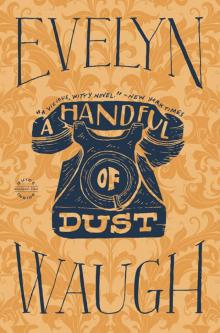 A Handful of Dust
A Handful of Dust Complete Stories of Eveyln
Complete Stories of Eveyln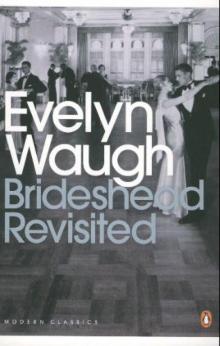 Brideshead Revisited
Brideshead Revisited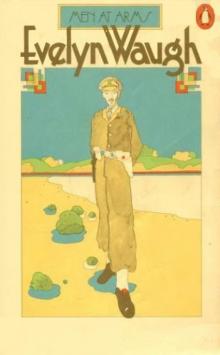 Men at Arms
Men at Arms Black Mischief
Black Mischief When the Going Was Good
When the Going Was Good Officers and Gentlemen
Officers and Gentlemen Helena
Helena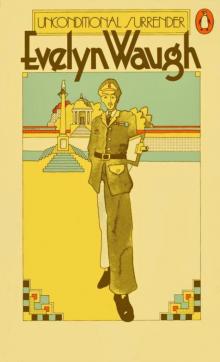 Unconditional Surrender
Unconditional Surrender The Ordeal of Gilbert Pinfold
The Ordeal of Gilbert Pinfold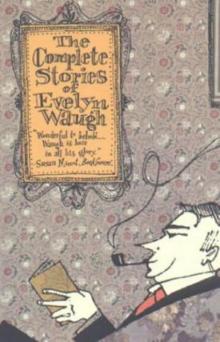 The Complete Stories Of Evelyn Waugh
The Complete Stories Of Evelyn Waugh